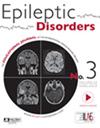Temporoporal metabolic abnormalities in temporal lobe epilepsies
IF 1.9
4区 医学
Q3 CLINICAL NEUROLOGY
引用次数: 0
Abstract
Positron emission tomography (PET) may be used to map regional cerebral glucose metabolism using颞叶癫痫的颞叶代谢异常
正电子发射断层扫描(PET)可用于利用 18 F-脱氧葡萄糖-PET绘制部分性癫痫患者的区域性脑葡萄糖代谢图。据报道,大多数药物难治性部分性癫痫患者的葡萄糖代谢降低区域通常比潜在的解剖异常区域更广泛。这些功能性变化有助于在手术前确定致痫灶。然而,在没有肿块病变的颞叶中叶癫痫(MTLE)患者中,代谢减低涉及颞叶的大片区域,包括中叶结构、颞极和部分颞外侧皮层。在这类 MTLE 患者中,皮层下结构和颞叶外区域也经常出现代谢低下。这种大面积代谢低下的原因仍有争议。在 MTLE 患者中,颞极区的代谢功能最弱。这种颞极代谢低下的临床意义尚不清楚。发作间期代谢低下的病理生理学可能涉及多种机制,如神经元缺失、失代偿、发作后抑制和其他癫痫相关现象。发作间期颞极代谢减低与癫痫发作开始或发作扩散之间的关系仍有待推测。
本文章由计算机程序翻译,如有差异,请以英文原文为准。
求助全文
约1分钟内获得全文
求助全文
来源期刊

Epileptic Disorders
医学-临床神经学
CiteScore
4.10
自引率
8.70%
发文量
138
审稿时长
6-12 weeks
期刊介绍:
Epileptic Disorders is the leading forum where all experts and medical studentswho wish to improve their understanding of epilepsy and related disorders can share practical experiences surrounding diagnosis and care, natural history, and management of seizures.
Epileptic Disorders is the official E-journal of the International League Against Epilepsy for educational communication. As the journal celebrates its 20th anniversary, it will now be available only as an online version. Its mission is to create educational links between epileptologists and other health professionals in clinical practice and scientists or physicians in research-based institutions. This change is accompanied by an increase in the number of issues per year, from 4 to 6, to ensure regular diffusion of recently published material (high quality Review and Seminar in Epileptology papers; Original Research articles or Case reports of educational value; MultiMedia Teaching Material), to serve the global medical community that cares for those affected by epilepsy.
 求助内容:
求助内容: 应助结果提醒方式:
应助结果提醒方式:


